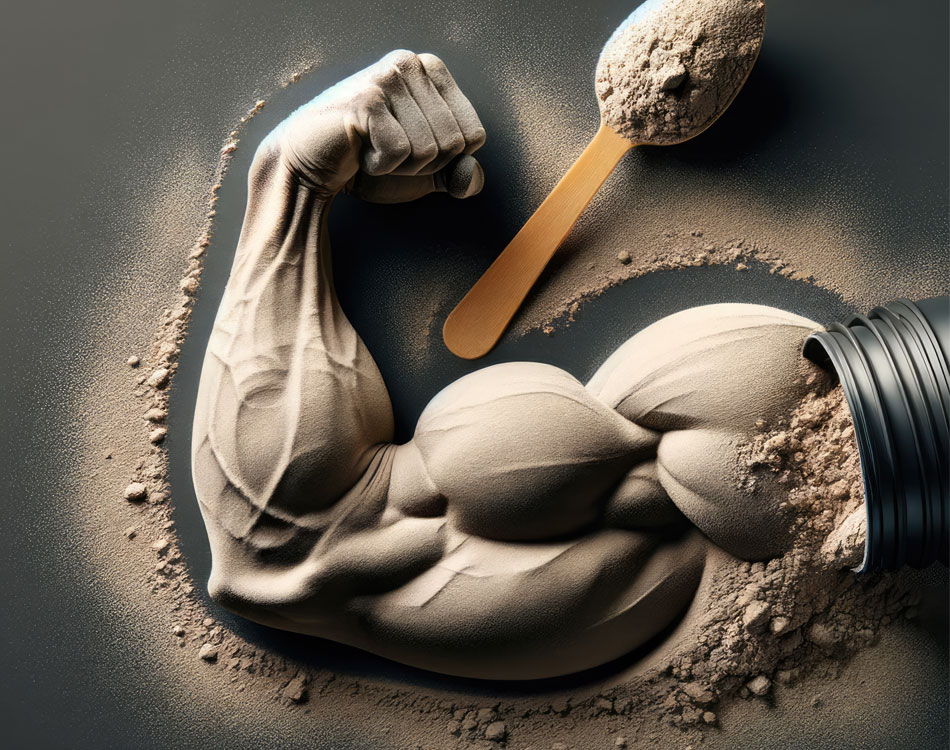There are no free rides on the gains train. Arriving at destination muscle is exhausting, not just in the gym but in the kitchen too, which is why a mass gainer supplement is so beneficial.
While adding serious size needs an intense weight training programme built around the core compound lifts, physically consuming the calories required to fuel serious gains in muscle size is often the hardest part of a mass-building plan.
Recommended calorie intakes for those looking to add significant mass, particularly hard gainers, can exceed 3,500 calories a day during a bulking phase, which is a significant daily intake.
READ MORE | The Hard-Gainer’s Guide To Serious Gainz
Skip the dirty bulk
However, a comprehensive nutrition and supplement plan that supports recovery and muscle growth with sufficient calories and the right combination of macronutrients is the cornerstone of any successful mass gain plan.
That means giving the hollow calories from fast foods, processed ingredients and convenience products in the conventional ‘dirty bulk’ a skip and focusing instead on quality nutrients and calorie-dense foods from natural sources.
READ MORE | The Science-Backed Method To Build Muscle And Lose Fat Simultaneously
Bulk up your diet
A mass gainer supplement offers a convenient and tasty way to support – not replace – a predominantly whole-food diet, helping you hit that daily calorie target and meet your macronutrient requirements.
When it comes to selecting the best supplement to support your growth, you need something that delivers the right amount of calories and energy from carbohydrates and sufficient protein to repair damaged muscle tissue and support growth.
READ MORE | Gain Mass The Natural Way With Biogen Bulk Raw Food Gainer
Selecting the right product
When choosing the best mass gainer supplement, opt for a product rich in carbs and protein with low to moderate amounts of fat. Other important factors to consider include the sources of these mass-building macronutrients.
Protein is the building block of muscle tissue, which means your chosen mass gainer should deliver the right dose per serving and in the best forms to support muscle repair and growth.
Most mass-builders are formulated with whey protein to support the muscle-building process, delivering 30-60g of protein per serving. For example, Biogen Rage Ultra Mass is a cutting-edge muscle-building formulation with a high protein content.
Each serving contains an exceptional level of amino acid content, and the added taurine and creatine monohydrate contribute to improved power and strength.
Every 300g serving of Biogen Rage Ultra Mass delivers:
- up to 1,166 calories
- 30g of protein
- up to 237g of carbohydrates
- 3,000mg of Creatine Monohydrate
- 2,500mg of L-glutamine
- 1 000mg of Taurine
READ MORE | Innovation Is The Name Of The Game In The Supplement Sector
Totally carbed up
Mass gainers that contain a mix of carb sources, including faster-digesting and more complex carbs, help keep glycogen levels topped up to fuel intense training with immediate and sustained energy release and support muscle growth and recovery processes.
A carb blend can also support the anabolic response after exercise by exploiting the post-exercise insulin response, which is vital to ensure circulating amino acids from the protein in your shake are pulled into muscle cells and keeping levels of the stress hormone cortisol in check after training, which can limit muscle breakdown.
A product like Biogen Bulk 45/150 Mass Gainer provides the body with ample energy from a precise blend of carbohydrate sources to help steadily replenish glycogen stores, assist with boosting energy levels during training, help alleviate muscle breakdown after training and promote the overall bulking up process.
Each 226g serving of Biogen Bulk 45/150 Mass Gainer delivers:
- 863 calories
- 45g of protein
- 150g of carbohydrates
In addition, Biogen has included a multivitamin, multi-mineral and antioxidant blend.
Dairy-free options
Some gym-goers may also want an alternative to dairy-based mass gainers to reduce their animal protein intake for health, environmental or ethical reasons.
In response, supplement manufacturers like Biogen have responded by creating high-quality mass gainers that contain plant-based protein and other vegan-friendly ingredients.
While the ingredients and protein sources generally differ, plant protein and whey-based mass gainers can help you bulk up by delivering similar carb, protein and fat contents per serving. The plant-based products simply cater to different needs and preferences.
The main difference between the products is the protein sources, with plant-based mass gainers typically using a combination of plant proteins to deliver a complete amino acid profile.
While some people mistakenly believe that plant-based protein is inferior to whey due to differences in the amino acid content and bioavailability, vegan-friendly supplements are scientifically proven1 to deliver similar muscle-building benefits.
You may also find differences between plant-based and traditional mass gainer formulations in the carbohydrate sources used. Products like Biogen Bulk Raw derive the carbs in their formulations from whole-food sources, such as sweet potato, oats and rice, which offer a higher fibre content over traditional mass gainers. This fibre content may aid digestion and support better gut health.
Each 100g serving of Biogen Bulk Raw delivers:
- 356 calories
- 27g of protein
- 35g of carbohydrates
The other factor to consider when selecting mass gainers is palatability. Whey-based products typically offer a wider range of flavour options, and plant-based products generally have a grainy texture compared to whey.
The choice, at the end of the day, relates to your preferences and lifestyle as both products offer an effective way to support those hard-fought gains in the gym.
References
-
Banaszek A, Townsend JR, Bender D, Vantrease WC, Marshall AC, Johnson KD. The Effects of Whey vs. Pea Protein on Physical Adaptations Following 8-Weeks of High-Intensity Functional Training (HIFT): A Pilot Study. Sports (Basel). 2019 Jan 4;7(1):12. doi: 10.3390/sports7010012. PMID: 30621129; PMCID: PMC6358922.















